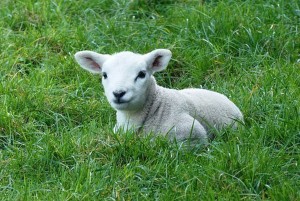“God should know better, is what I’m saying.”
 Jerusalem, April 14 – This weekend will see the Holy Temple crowded with pilgrims bringing the special annual Passover sacrifice and its associated rituals, but one worshiper finds fault with the Creator and Sustainer of the universe and the source of reality itself, because that Creator neglected to provide an alternative that does not involve the death and consumption of animal flesh.
Jerusalem, April 14 – This weekend will see the Holy Temple crowded with pilgrims bringing the special annual Passover sacrifice and its associated rituals, but one worshiper finds fault with the Creator and Sustainer of the universe and the source of reality itself, because that Creator neglected to provide an alternative that does not involve the death and consumption of animal flesh.
Guy Hinnom, 22, adheres to a strict vegan diet and attempts as far as possible to avoid meeting his physical needs or desires by any means that involves animal suffering or exploitation, to the point that he wears only plant-based clothing, footwear, and head-coverings, and refuses to condone, let alone consume, livestock. Unfortunately for Mr. Hinnom, Passover represents one of three yearly pilgrimage festivals during which every male adult must appear in the Temple and bring at least two animal offerings, one of which sees its flesh consumed by the altar’s fire and the other that the pilgrim must eat. Passover involves an additional animal offering on the eve of the festival as a reenactment of the original ritual that heralded the Exodus from ancient Egypt. The meat-centered service does not sit well with the yoga instructor and reiki healing practitioner, who wonders why obligatory plant-based offerings occur only as a penalty for a few specific sins, and then only when the sinner has almost no money.
“It’s not like there isn’t precedent for vegan alternatives,” challenged Hinnom. “When someone swears falsely, or enters the Temple in a state of uncleanliness, the prescribed offering is by default a sheep or goat, but one who can’t afford that may bring two pigeons – and one who can’t afford even that may bring a meal-offering of just fine flour. I maintain that I – and we as a society that aspires to live a moral life – simply cannot afford to continue exploiting animals for our spiritual needs, just as I avoid doing so for my physical needs. God should know better, is what I’m saying.”
“Maybe He doesn’t realize because he’s so lofty and doesn’t feel an animal’s pain,” added Hinnom, unaware of the sacrilege his words contained. “And obviously this isn’t restricted to Passover. There are animal offerings at least twice a day regardless.”
Experts note that the use of animals serves to drive home the existential dependence of humans on their Creator, with the beasts playing a proxy role. “In our agrarian society, people have a familiarity, I would say an intimacy, with animals, that makes the slaughter of those animals not some abstracted ritual, but an emphasis on the fragility and interconnectedness of life,” explained Zachariah, a member of the priestly Kohen caste that performs the divine service. “The involvement of the animals in the divine service raises the animal, the mundane, and one might say bestial, to the transcendent, especially when that involves sharing with the divine the consumption of that animal.”
“But this guy is obviously more moral than God, the creator of morality itself,” acknowledged the priest. “I see his conflict.”
Please support our work through Patreon.




